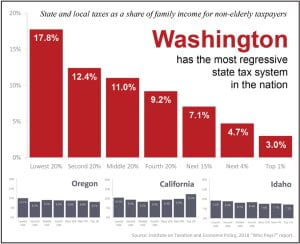Published Jan 16, 2023 in Puget Sound Business Journal
 On January 26, the Washington State Supreme Court will hear arguments about whether to uphold the state’s new 7% tax on stock profits larger than $250,000. Foremost, the Court should let the tax stand because it is constitutional. But the tax will also allow Washington’s small towns, especially those that are struggling, to see outsized benefits as it will help fund the new child care services that so many of our state’s rural communities desperately need.
On January 26, the Washington State Supreme Court will hear arguments about whether to uphold the state’s new 7% tax on stock profits larger than $250,000. Foremost, the Court should let the tax stand because it is constitutional. But the tax will also allow Washington’s small towns, especially those that are struggling, to see outsized benefits as it will help fund the new child care services that so many of our state’s rural communities desperately need.
As an economist, I’ve joined numerous rural leaders, including Pullman small business owner Nick Pitsilionis, in an amicus brief urging the State Supreme Court to help rural economies by upholding the tax.
Nick Pitsilionis owns a restaurant where his employees sometimes miss their shifts, or bring their children to work, because they cannot find affordable child care. He does what he can to accommodate them, sometimes even allowing their children to sit in the restaurant’s office while their parents work. He says the lack of adequate child care in Pullman puts a strain on the rest of his crew, who must pick up the slack when an employee misses work because they lack good child care options.
The child care crisis is a systemic problem for rural parents, employers, and small business owners from Pullman to Puyallup. In 15 Washington counties, over 50% of families with children four years-old or younger live in a childcare desert. This common sense tax will allow our state to boost investments in child care and preschools, much of which would be directed to rural families.
Washington’s regressive tax system disadvantages small business owners like Nick Pitsilionis, who must pay a larger share of their income in taxes. Lower-income rural families pay a much larger share of their income to taxes than do the wealthiest individuals, the vast majority of whom reside in urban areas. According to the Institute on Taxation and Economic Policy, the poorest fifth of Washington’s households on average pay 17.8% of their income in state and local taxes. By contrast, the wealthiest 1% of households pay an average of 3%.
While this new tax on windfall capital gains won’t by itself move Washington from having the nation’s worst, most inequitable tax system to its best, it represents a step in the right direction. It will help make our state a more equitable one to live in, especially for those in rural communities where many people make low wages.
Who exactly will pay this new tax? An estimated 0.2% of Washington taxpayers, the richest of the rich who reap millions each year from their sales of stock. Most of those expected to pay the tax, including the state’s 13 billionaires, are exceptionally wealthy people living in King County and other mostly urban parts of our state. According to the Washington State Budget and Policy Center, only 10% of those paying this new tax reside in eastern Washington,
Thus, the vast majority of Washingtonians will not be affected by this new tax on stock profits because it exempts capital gains arising from the sale of many non-stock assets – real estate, retirement funds, pensions, farms and livestock, and small family-owned businesses.
Yet even with these broad exemptions, the new tax is expected to raise $500 million annually for child care, pre-school and other education programs vital to our communities. If this amount seems incredible, it’s because the amount of wealth Washington’s super-rich accumulate through their routine sales of stock is hard for most of us to fathom.
Without this new tax on stock sales, residents in Washington’s rural communities will continue to be disproportionately harmed by our state’s regressive taxes and inadequate public investments in child care. The Washington Supreme Court should do the right thing and uphold this tax which will help invest in our communities and our future.
Katie Baird is a Professor of Economics at the University of Washington Tacoma. Reach her at kebaird@uw.edu.
